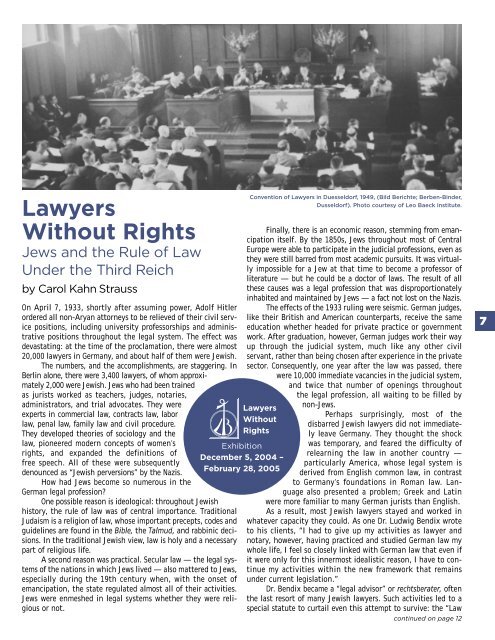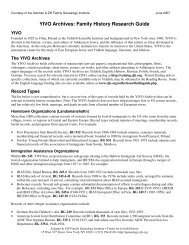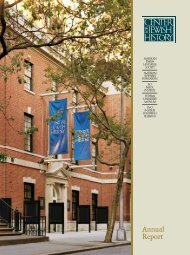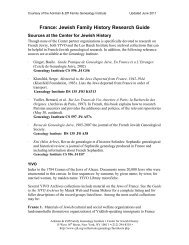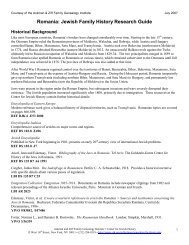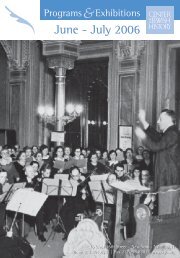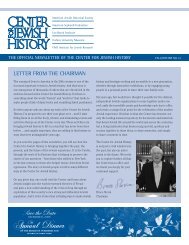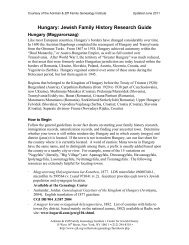ib singer ib singer ib singer ib singer ib singer - Center for Jewish ...
ib singer ib singer ib singer ib singer ib singer - Center for Jewish ...
ib singer ib singer ib singer ib singer ib singer - Center for Jewish ...
You also want an ePaper? Increase the reach of your titles
YUMPU automatically turns print PDFs into web optimized ePapers that Google loves.
Lawyers<br />
Without Rights<br />
Jews and the Rule of Law<br />
Under the Third Reich<br />
by Carol Kahn Strauss<br />
On April 7, 1933, shortly after assuming power, Adolf Hitler<br />
ordered all non-Aryan attorneys to be relieved of their civil service<br />
positions, including university professorships and administrative<br />
positions throughout the legal system. The effect was<br />
devastating: at the time of the proclamation, there were almost<br />
20,000 lawyers in Germany, and about half of them were <strong>Jewish</strong>.<br />
The numbers, and the accomplishments, are staggering. In<br />
Berlin alone, there were 3,400 lawyers, of whom approximately<br />
2,000 were <strong>Jewish</strong>. Jews who had been trained<br />
as jurists worked as teachers, judges, notaries,<br />
administrators, and trial advocates. They were<br />
experts in commercial law, contracts law, labor<br />
law, penal law, family law and civil procedure.<br />
They developed theories of sociology and the<br />
law, pioneered modern concepts of women’s<br />
rights, and expanded the definitions of<br />
free speech. All of these were subsequently<br />
denounced as “<strong>Jewish</strong> perversions” by the Nazis.<br />
How had Jews become so numerous in the<br />
German legal profession?<br />
One poss<strong>ib</strong>le reason is ideological: throughout <strong>Jewish</strong><br />
history, the rule of law was of central importance. Traditional<br />
Judaism is a religion of law, whose important precepts, codes and<br />
guidelines are found in the B<strong>ib</strong>le, the Talmud, and rabbinic decisions.<br />
In the traditional <strong>Jewish</strong> view, law is holy and a necessary<br />
part of religious life.<br />
A second reason was practical. Secular law — the legal systems<br />
of the nations in which Jews lived — also mattered to Jews,<br />
especially during the 19th century when, with the onset of<br />
emancipation, the state regulated almost all of their activities.<br />
Jews were enmeshed in legal systems whether they were religious<br />
or not.<br />
Convention of Lawyers in Duesseldorf, 1949, (Bild Berichte; Berben-Binder,<br />
Dusseldorf). Photo courtesy of Leo Baeck Institute.<br />
Finally, there is an economic reason, stemming from emancipation<br />
itself. By the 1850s, Jews throughout most of Central<br />
Europe were able to participate in the judicial professions, even as<br />
they were still barred from most academic pursuits. It was virtually<br />
imposs<strong>ib</strong>le <strong>for</strong> a Jew at that time to become a professor of<br />
literature — but he could be a doctor of laws. The result of all<br />
these causes was a legal profession that was disproportionately<br />
inhabited and maintained by Jews — a fact not lost on the Nazis.<br />
The effects of the 1933 ruling were seismic. German judges,<br />
like their British and American counterparts, receive the same<br />
education whether headed <strong>for</strong> private practice or government<br />
work. After graduation, however, German judges work their way<br />
up through the judicial system, much like any other civil<br />
servant, rather than being chosen after experience in the private<br />
sector. Consequently, one year after the law was passed, there<br />
were 10,000 immediate vacancies in the judicial system,<br />
and twice that number of openings throughout<br />
the legal profession, all waiting to be filled by<br />
Lawyers<br />
non-Jews.<br />
Perhaps surprisingly, most of the<br />
Without<br />
disbarred <strong>Jewish</strong> lawyers did not immediate-<br />
Rights ly leave Germany. They thought the shock<br />
Exh<strong>ib</strong>ition<br />
was temporary, and feared the difficulty of<br />
relearning the law in another country —<br />
December 5, 2004 –<br />
particularly America, whose legal system is<br />
February 28, 2005<br />
derived from English common law, in contrast<br />
to Germany’s foundations in Roman law. Language<br />
also presented a problem; Greek and Latin<br />
were more familiar to many German jurists than English.<br />
As a result, most <strong>Jewish</strong> lawyers stayed and worked in<br />
whatever capacity they could. As one Dr. Ludwig Bendix wrote<br />
to his clients, “I had to give up my activities as lawyer and<br />
notary, however, having practiced and studied German law my<br />
whole life, I feel so closely linked with German law that even if<br />
it were only <strong>for</strong> this innermost idealistic reason, I have to continue<br />
my activities within the new framework that remains<br />
under current legislation.”<br />
Dr. Bendix became a “legal advisor” or rechtsberater, often<br />
the last resort of many <strong>Jewish</strong> lawyers. Such activities led to a<br />
special statute to curtail even this attempt to survive: the “Law<br />
continued on page 12<br />
37


